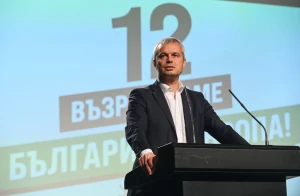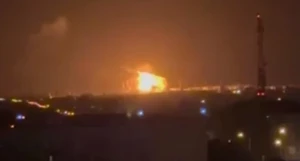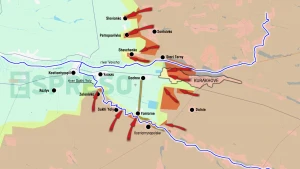
Russians fell into their trap: serviceman about fighting in Kursk region
Ukrainian serviceman Ivan Tymochko highlights the importance of not officially naming the troops in the Kursk region, as Russians often claim "it's not us, it's polite people”
He spoke about this on Espreso TV.
"The Russians were fueling the crisis around the Sumy region, threatening with their large military contingent, claiming that 25,000 personnel were ready for an offensive and another 50,000 in the rear. And when they saw that our Armed Forces were pulling up to the border in the Sumy region to counter such a potential invasion, they did not notice how unknown forces entered their territory. Perhaps forces that are friendly to Ukraine somewhere, but are currently unknown. And it turned out that there were neither 25,000 stormtroopers on the border, nor 50,000 soldiers in the rear, but there were some conscripts, retreating Kadyrov forces and a few border guards who decided not to die but to surrender," commented Ivan Tymochko.
According to him, it turned out that the roads in the Kursk region are quite good, which made it possible for the unnamed troops to move quickly deep into Russian territory.
"This is really important, because we see that the Russians have fallen into their second trap, which they have always liked to hide behind, saying that "it's not us, it's polite people." By the way, the local population of the Belgorod and Kursk regions keep saying that the military are very well-mannered, polite, and do not loot or abuse them. The locals are now afraid that the "valiant Russian army" will start bombing them and hunt them down. In addition, they complain that those who wanted to escape had to leave without the support of the Russian state, which forgot about them, especially when they now have a declared counterterrorism operation," said the head of the Council of Reservists of the Armed Forces of Ukraine.
Tymochko added that ealier Russia declared such a state of emergency in Chechnya, which meant that Moscow decided not to allow the flow of refugees to move deeper into Russian territory, because they would then have to be provided with housing and food.
"That is, the Russian government decided not to take on a lot of trouble by closing the borders of those regions. And they also probably want to open up the possibility of total bombing of civilian settlements. In general, it's very good that the war has moved to Russia, it's a necessary situation to make it clear to the Russians that they will not be able to fight endlessly. Because every week, every month they drag out the war in Ukraine will bring harm and destruction to them," the soldier summarized.
Ukraine’s cross-border incursion in Russia’s Kursk region
On August 6, the authorities of Russia's Kursk region stated that the Ukrainian Armed Forces allegedly tried to break through the Russian border, but were allegedly pushed back. Later, the Russian Defense Ministry reported that "the Ukrainian sabotage and reconnaissance group retreated to its territory.”
Ukraine's Main Intelligence Directorate refused to comment on the statements regarding the Kursk region. However, NV media, citing its own source in Ukrainian intelligence, wrote that the events in the Kursk region "definitely did not involve fighters of the Russian Volunteer Corps, who are fighting as part of Ukraine's Armed Forces.”
The Institute for the Study of War noted that the Russian Defense Ministry, acting governor of the Kursk region Alexei Smirnov, and some propagandists have different versions of the events in the Kursk region.
On August 7, Kremlin leader Vladimir Putin convened the Russian military leadership to discuss the situation in the Kursk region, which he called a "large-scale provocation." At the time, Russian Foreign Ministry spokeswoman Maria Zakharova called on the international community to "strongly condemn the Kyiv regime's criminal attacks on Russian territory."
On the same day, Russian media reported that workers at the Kursk nuclear power plant feared that the plant's management had not prepared for a possible attack by the Ukrainian armed forces.
Additionally, in the Kursk region, the Russians have started forming UAV operator units from civilians, providing them with up to 10 hours of training.
On August 7, a state of emergency was introduced in the Kursk region.
On August 8, the Institute for War Studies reported that Ukrainian troops confirmed advancing up to 10 km deep into the Kursk region as mechanized offensives continued.
On August 8, Russia’s National Guard announced that it had implemented additional security measures at the Kursk Nuclear Power Plant to protect a "particularly important facility."
The Washington Post reported that Ukraine has taken control of the gas metering station in Sudzha, Kursk region. Previously, Russia claimed that the Ukrainian Armed Forces had occupied several border villages and part of the town of Sudzha.
Deputy Pentagon Press Secretary Sabrina Singh stated that Ukraine’s actions in the Kursk region in Russia "are consistent with U.S. policy" and do not cause any escalation.
On Friday, August 9, it was reported that terrorists from PMC Wagner intend to fight for Russia in the Kursk region.
On the night of Saturday, August 10, the authorities introduced a counterterrorism operation in the Bryansk, Kursk, and Belgorod regions of Russia.
- News














































